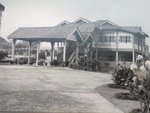The Oxford Business Group reported on 22nd May 2009 as follows:
+++++
Brunei Darussalam: Relative Calm
Brunei's real estate sector appears to be little affected by the global recession, with transaction levels remaining stable and prices relatively flat, though it is unlikely the property market will experience strong growth in the short term due to a number of issues limiting investment activity.
According to Lim Poh Yeh, the general manager of White Castle Real Estate and Development, demand for residential property continues to be high, though this can depend on the location of the home offered for sale.
"It depends on the budget of the family or individual, but the demand for housing in Brunei is there, it's just a matter of what is available in the market," Lim said in an interview with local press at the end of March.
A large part of that demand comes from the lower-income segment of the community, those eligible for state housing support and who are unable to buy on the open market. Latest figures put the waiting list for subsidised housing at around 17,000, though this will be cut under a new programme announced in late February by the Brunei Economic Development Board.
As part of the state's National Housing Scheme, 2000 new houses will be built on a 180-ha greenfield site at Kampung Pandan in Kuala Belait, with the project to be completed within two years.
Though the market as a whole has not been negatively affected by the international economic crisis, there remains an oversupply of stock in some segments, especially in mid-range retail properties and the high-end residential segment. With fewer expatriate workers coming to Brunei, the call for more luxurious accommodation has dropped off somewhat, while more recently constructed commercial and residential properties built during the oil price boom - a time when the costs of construction materials were at a premium - are struggling to find takers willing to pay a price that will cover the building cost.
There are also a number of factors that are holding back the real estate sector's rate of growth according to local experts, with one of the main issues being the restrictions on foreign investment and ownership.
Though Brunei has approved legislation allowing foreigners to buy property within the Sultanate, it has not as yet come into force. This may soon change, with Begawan Mudim Dato Paduka Hj Bakar, the minister of development, telling the Legislative Council in mid-March that, while complexities of one of its regulations have delayed its implementation, it was hoped the legislation would be enacted in the very near future.
If so, this could stimulate the local property market, as well as encourage overseas investment in residential and commercial developments.
The shortage of land for development is also a limiting factor for the sector, with less than 10% of land privately owned, mostly along Brunei's coastal strip, with a further 8% held under temporary occupation licences. A further 35% of Brunei's territory has been declared as virgin forest, and is strictly protected from development, while the remaining land is in state hands.
The lack of prime development sites and the slow pace at which freehold land is made available does impact on the sector, said Lim.
"Sometimes we have to wait for a very long time for the landowners to decide whether they want to sell their land or not," he said.
Some in the industry are also concerned that a newly instituted property tax may take some of the heat out of property sector, with local media citing real estate professionals as saying the new tax will slow down market growth and discourage prospective investors and businesses.
Announced in December last year and implemented as of April 1, the tax levies a 12% charge on the annual rental fees of commercial and residential properties in the greater Bandar Seri Begawan area, while buildings used by their owners for commercial or residential purposes are assessed at a standard rate of $3.60 per sq metre.
However, while there was a general consensus that commercial sales and rentals may be affected, the demand for residential properties would help sustain the market.
If, as expected, the property market in Brunei remains stable throughout the global financial crisis, it would have a sound platform to build on when the local and regional economies return to higher rates of growth. This platform will be further strengthened if more land is made available for private development and restrictions on foreign ownership are eased.
+++++
Welcome to my private journal generally on Brunei issues. Any opinions expressed are in my personal capacity. All rights to the articles are reserved.
Saturday, May 23, 2009
Subscribe to:
Post Comments (Atom)







No comments:
Post a Comment